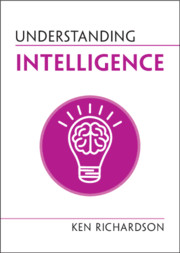
-
Select format
-
- Publisher:
- Cambridge University Press
- Publication date:
- 13 January 2022
- 03 February 2022
- ISBN:
- 9781108937757
- 9781108837132
- 9781108940368
- Dimensions:
- (178 x 127 mm)
- Weight & Pages:
- 0.34kg, 150 Pages
- Dimensions:
- (178 x 127 mm)
- Weight & Pages:
- 0.27kg, 246 Pages
- Subjects:
- Life Sciences, Evolutionary Biology, Philosophy of Science, Neurosciences, Psychology, Cognition
- Series:
- Understanding Life
You may already have access via personal or institutional login- Subjects:
- Life Sciences, Evolutionary Biology, Philosophy of Science, Neurosciences, Psychology, Cognition
- Series:
- Understanding Life
Book description
Have you ever wondered why psychologists still can't agree on what intelligence is? Or felt dismayed by debates around individual differences? Criticising the pitfalls of IQ testing, this book explains the true nature of intelligent systems, and their evolution from cells to brains to culture and human minds. Understanding Intelligence debunks many of the myths and misunderstandings surrounding intelligence. It takes a new look at the nature of the environment and the development of 'talent' and achievement. This brings fresh and radical implications for promoting intelligence and creativity, and prompts readers to reconsider their own possibilities and aspirations. Providing a broad context to the subject, the author also unmasks the ideological distortions of intelligence in racism and eugenics, and the suppressed expectations across social classes and genders. This book is a must-read for anyone curious about our own intelligence.
Reviews
‘Ken Richardson has written a masterful book about intelligence. In contrast to what leading behavioural geneticists and psychometrically oriented psychologists see as the moderately or highly heritable trait of general intelligence (IQ), Richardson explains why psychometric and behavioural genetic arguments fail, and how intelligence should be seen as a socially acquired characteristic. A longstanding expert on intelligence, he writes in a manner that can be understood by both academic and general readers. I strongly recommend this book as an accessible and important counterweight to mainstream descriptions of intelligence in the fields of psychology and behavioural genetics, and in the media.'
Source: Jay Joseph, Psy.D., psychologist and author, Oakland, California, USA
‘Ken Richardson's Understanding Intelligence is a timely and important addition to Cambridge University Press's groundbreaking Understanding Life series. Richardson provides a "natural history of intelligence", and no facet of that complex topic goes untouched – adaptive evolution, embryology, endocrinology, circadian rhythms, neural networks, cooperative hunting. In our current moment, where scholars and politicians alike are calling for gene-guided education and appealing to innate differences as the cause of racial disparities, Richardson debunks myth after myth about cognitive ability: that the brain is best conceptualised as a machine, that IQ tests measure intelligence, that different racial groups have naturally different intellectual aptitudes, that the genome is a programme for cognitive development. The esteemed psychologist, in exchange, offers a vision of intelligence as a dynamic, interactive, developing, adaptive system – a system that allows every person to intellectually flourish, if only they are given the opportunity.'
Source: James Tabery, Professor of Philosophy, University of Utah, USA
‘For decades, Ken Richardson has been a leading voice within the critical approaches to intelligence in psychology. He patiently and determinedly interrogated the often taken for granted assumptions – and myths – about the meaning of intelligence, about how it can be measured and tested, about its heritability or its applicability as a measure of intellectual ability in the school or the workplace. Understanding Intelligence provides a thoroughly researched and persuasively argued up-to-date overview of this important work. It is sure to become an indispensable resource for both academics and practitioners, and indeed for anyone interested in one of psychology's most controversial, and flawed, concepts.'
Source: Jovan Byford, Senior Lecturer in Psychology, The Open University, UK
Contents
-
1 - Testing, Testing
pp 1-24 -
-
- You have access
- HTML
- Export citation
-
Metrics
Altmetric attention score
Full text views
Full text views help Loading metrics...
Loading metrics...
* Views captured on Cambridge Core between #date#. This data will be updated every 24 hours.
Usage data cannot currently be displayed.
Accessibility standard: Unknown
Why this information is here
This section outlines the accessibility features of this content - including support for screen readers, full keyboard navigation and high-contrast display options. This may not be relevant for you.
Accessibility Information
Accessibility compliance for the PDF of this book is currently unknown and may be updated in the future.


